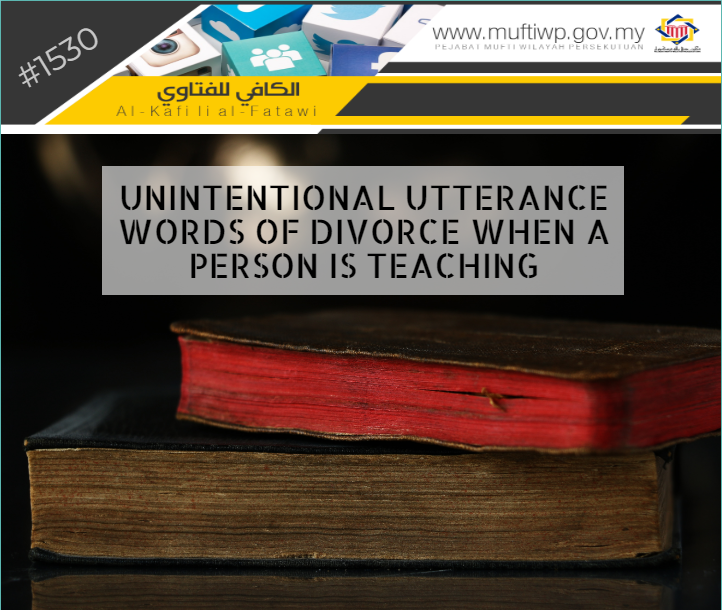Question:
Assalamualaikum wbt ustaz, I would like to ask. One day, my husband and I discussed the topic of talaq; when talaq is considered as valid and when it is invalid. My husband taught me examples of utterances that will be considered as talaq, while uttering my name without having the intention of divorce. My husband’s exact words were: “The example of utterance which causes talaq is, ‘I divorce you ‘my name’ with three talaq’. Only then it will be considered as talaq”. My question is, does the talaq that he uttered is considered as valid when my husband’s intention is only to teach me and not for the purpose of divorce?
Answer:
Alhamdulillah, praise and thanks to Allah for the countless blessings He has blessed us all with. Blessings and salutations to the Prophet Muhammad PBUH, his wives, his family, companions and all those that follow his teachings to the day of judgement.
We start this with the saying of the Prophet PBUH:
إِنَّمَا الأَعْمَالُ بِالنِّيَّاتِ، وَإِنَّمَا لِكُلِّ امْرِئٍ مَا نَوَى، فَمَنْ كَانَتْ هِجْرَتُهُ إِلَى دُنْيَا يُصِيبُهَا أَوْ إِلَى امْرَأَةٍ يَنْكِحُهَا فَهِجْرَتُهُ إِلَى مَا هَاجَرَ إِلَيْهِ
"The reward of deeds depends upon the intentions and every person will get the reward according to what he has intended. So whoever emigrated for worldly benefits or for a woman to marry, his emigration was for what he emigrated for."
Sahih al-Bukhari (1), Sahih Muslim (1907)
This hadith explains that our every action should be accompanied with intention. This is because, if any act of worship performed without having or accompanied by intention, then it is invalid. This hadith is also an important base of many matters and rulings like ibadah (worships), muamalat (dealings), munakahat (marriage) especially in the matter of divorce. Intention is the third requisite from the requisites of talaq and it is related to sighah (pronouncement) and the conditions of the one who pronounces the talaq. [See: al-Mu’tamad fi al-Fiqh al-Syafi’I; 4/163].
So, referring back to the above question, pertaining the ruling of a person who pronounces talaq to his wife for the purpose of teaching or educating, the Shafi’ite scholars group this under the chapter of sabq al-lisan (a slip of the tongue) under the third requisite of talaq which is al-Qasd (intention). Hence, we list out some opinions of the scholars in this issue.
Imam Zakariyya al-Anshori said:
(الرُّكْنُ الثَّالِثُ قَصْدُ الطَّلَاقِ فَيُشْتَرَطُ قَصْدُ اللَّفْظِ بِمَعْنَاهُ) أَيْ مَعَهُ لِيُزِيلَ مِلْكَ النِّكَاحِ... الْمُعْتَبَرَ قَصْدُ اللَّفْظِ وَالْمَعْنَى مَعًا وَاعْتُبِرَ قَصْدُ الْمَعْنَى لِيَخْرُجَ حِكَايَةُ طَلَاقِ الْغَيْرِ وَتَصْوِيرُ الْفَقِيهِ وَالنِّدَاءُ بِطَالِقٍ لِمُسَمَّاةٍ بِه
(Pertaining to) the third requisite which is the intention for talaq, it is a condition to set the intention and mean it by one’s heart, in which due to this, akad (solemnization) will be annulled… what is mu’tabar (accredited) is by having intention through words and meaning, this also means that there are exceptions like telling on the talaq of others and the story of a faqih and a woman whose name is like that (taliq; divorced).
[See: Asna al-Matholib; 3/280]
Syeikh Dr Muhammad al-Zuhaily said:
وكذا إذا تلفظ الشخص بالطلاق حاكيًا كلام غيره، وكذلك الفقيه إذا تكرر لفظ الطلاق في درسه وتصويره، فهو لغو، لعدم القصد
The same is for when one pronounces talaq as a story of others’ words, and the same if a faqih repeats talaq utterances in his class or explaining about it. It is then considered useless (invalid) as there is no intention for it.
[See: al-Mu’tamad fi al-Fiqh al-Syafi’i; 4/164]
Syeikh al-Doktor Wahbah al-Zuhaily then said that talaq will not take place for a faqih who repeats the utterance and upon those who are narrating the story about others or themselves but it is not in their intention to get a divorce, but, just as lessons and to explain about it. [See: al-Fiqh al-Islami wa Adillatuhu; 7/368].
Closing
In conclusion, our say in the ruling of a husband uttering talaq to his wife to give example with the purpose of learning or narrating of a story will not cause talaq to take place except if he means it in his heart to pronounce the talaq, and only then talaq will take place. However, if there is still a confusion or refutation, then, it is best to refer to the Shariah court. Our advice to the public is, even when one wants to teach about the utterances of talaq, it is best to not use his own wife’s name as an example. And we also advise to not joke or belittle this issue of talaq as the Prophet PBUH said:
ثَلاَثٌ جِدُّهُنَّ جِدٌّ وَهَزْلُهُنَّ جِدٌّ النِّكَاحُ وَالطَّلاَقُ وَالرَّجْعَةُ
There are three things which, whether undertaken seriously or in jest, are treated as serious: Marriage, divorce and taking back a wife (after a divorce which is not final)
Sunan Abi Dawud (2194)
Lastly, we pray that Allah SWT bless our life with His blessings and mercy as well as blessings all of our actions.
Wallahua’lam.


